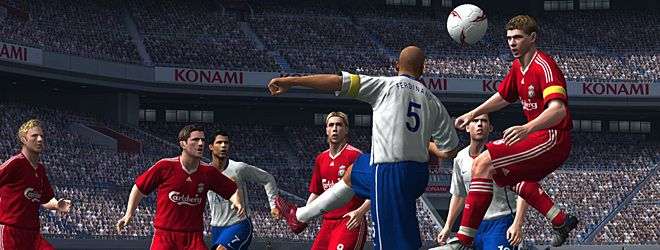Is Anybody Out There?
by Jack
 “Alright, love, no need to push”, said the lady playing Project Gotham Racing 3. She was talking to me. We were both racing for 7th in an eight car race and I had just come into a corner much too fast and decided to throw my car into hers to keep myself from skidding right off of the track – it worked. This happened just over five years ago and it is one of my earliest experiences of meeting another gamer willing to interact with a random stranger in the faceless world of online gaming.
“Alright, love, no need to push”, said the lady playing Project Gotham Racing 3. She was talking to me. We were both racing for 7th in an eight car race and I had just come into a corner much too fast and decided to throw my car into hers to keep myself from skidding right off of the track – it worked. This happened just over five years ago and it is one of my earliest experiences of meeting another gamer willing to interact with a random stranger in the faceless world of online gaming.
This brief memory is important to me because it’s a contrast to something missing in online gaming today – social interaction. These kinds of random encounters with other gamers are no longer there to be found. I believe that people no longer choose to engage with one another. If an individual wants to include a social side to their gaming, they must now do so in dedicated communities, gaming clans and guilds, or by restricting themselves to their own friendship groups. No longer can it be found in our everyday experiences of the games we play online.
Why is that? Why do people leave the talking to the AI, not bothering to plug in their microphones anymore? Is it because of those generic ten year-olds screaming down their microphones that seems to plague every gamer’s online experience, or is it something else? Whilst I can’t pretend to know I have all the answers, I am pretty confident that I’ve spotted a few of the problems. First of all: party chat. As Dan Howdle, the editor of X360 magazine explains: “Party chat killed it. While it made it altogether nicer and more friendly, it also forced people not to interact much with other parties.” It was four years ago in November when the Xbox Live Party feature was introduced to the world and allowed a total abandonment of the social aspects of the games being played with gamers now able to remain exclusively within their own little private ‘parties’ of up to eight players.
 A perfect example of what I feel are the devastating effects of party chat, is when I’ve been playing Halo 4 online for a few hours each night over the past couple of weeks and I am yet to meet a single gamer, besides my own friends, with a microphone plugged in and willing to talk. The only interaction that has taken place in this time was to listen to a gamer who had just done poorly in a game of Regicide plug in his microphone and tell us all: “Black Ops for the win, this game is horrific.” This is what we’re left with.
A perfect example of what I feel are the devastating effects of party chat, is when I’ve been playing Halo 4 online for a few hours each night over the past couple of weeks and I am yet to meet a single gamer, besides my own friends, with a microphone plugged in and willing to talk. The only interaction that has taken place in this time was to listen to a gamer who had just done poorly in a game of Regicide plug in his microphone and tell us all: “Black Ops for the win, this game is horrific.” This is what we’re left with.
“I believe we are seeing a significant decline in social interaction between online gamers. Online gaming is so pervasive now that the ‘coolness’ of interacting with someone across the world just isn’t there anymore. Now it seems as though all of the random people you actually hear online are there to troll or be annoying in general”, says Jack Pattillo, a senior producer at Achievement Hunter.
I was once playing a few games of Fifa 09 online team play, where everyone played a single position that made up two teams of 10 vs. 10. I was lucky enough to be the final addition in a team of some very passionate Englishmen who took the game of (virtual) football very seriously. We had a captain shouting out orders and the whole team was calling out open passes, telling each other who was in space and how much time they had on the ball. We played for many hours and it was some of the most fun I’ve ever had playing online. It’s one of my favourite stories to mention when I think about social interaction on an Xbox, but that was three years ago and I am still without any new stories to tell.
Howdle also shares this problem: “I personally ran out of great stories, which used to happen nightly, about people I met, things they said, at the start of 2008. Things had become compartmentalised. I personally miss it and yearn back to the time that each time I went online to play something it was full of random people having random interactions to entirely random consequence.”
So where have these random interactions gone? One place to look could be in the Xbox Live Friend’s list; looking at who we choose to game alongside might give a better idea of our own patterns of interaction online. Ashton Raze, a freelance journalist who has written for The Telegraph and GameSpot, gives a more enlightened view on the friend’s list’s role in all of this, by explaining that:
“As time goes on, more and more people hit the 100 friends cap. 100 people is a lot of people, so chances are you’ll have quite a diverse range of friends to play with anyway. But it also means that meeting new players is potentially more difficult, when the only way to make a new friend you play with regularly is to delete an old friend. Perhaps if the cap was raised somewhat, people would be more likely to look for new, like-minded friends via games themselves.”
 Raze also believes that a decline in the social interaction within gaming doesn’t necessarily exist, he thinks that instead “gaming has shifted to be more in line with almost every other type of social interaction; more intimate, more organised, less reliant on strangers.” The reason being that “the majority of the time it’s an accepted thing that you’ll find the best experiences by being part of a community, friendship group, clan or guild.” If we are to believe this then it means that we must accept an inconvenient truth about the social side of gaming, that it has moved on elsewhere leaving us lonely gamers, those with their microphones still plugged in, looking for the same old experiences – those same ones that convinced us to buy a subscription to Xbox Live in the first place, in a place where they no longer exist, stubbornly ignoring exactly where it is they’ve now moved on to.
Raze also believes that a decline in the social interaction within gaming doesn’t necessarily exist, he thinks that instead “gaming has shifted to be more in line with almost every other type of social interaction; more intimate, more organised, less reliant on strangers.” The reason being that “the majority of the time it’s an accepted thing that you’ll find the best experiences by being part of a community, friendship group, clan or guild.” If we are to believe this then it means that we must accept an inconvenient truth about the social side of gaming, that it has moved on elsewhere leaving us lonely gamers, those with their microphones still plugged in, looking for the same old experiences – those same ones that convinced us to buy a subscription to Xbox Live in the first place, in a place where they no longer exist, stubbornly ignoring exactly where it is they’ve now moved on to.
There is also the possibility that these memories of spontaneous social interactions of gaming online are just a romanticised view of the ‘earlier days’ and I’m simply choosing to ignore the possibility that things actually haven’t changed, especially since there have always been those dreaded high-pitched 10-year-olds, and any notable experiences with random gamers were just lucky exceptions. It’s possible, but I don’t think social gaming has been so static in its nature over the past few years. Even Raze concedes to the idea that the social elements of gaming have changed, accepting that “perhaps people were friendlier in the past purely because there were fewer people playing”, but he goes on to say that “the more popular something gets, the wider the range of people playing, so it’s not necessarily as easy to find people with mutual interests, and people go seeking out communities.”
 So what then are we left with? “Now when people think of voice communication while gaming, they think of the jerks who try to be loud or ruin it for everyone. The age of making prank calls is over and the age of online screaming has begun”, explains Pattillo. The social side of gaming it seems, at least on a casual level, is lost. It has moved on to the communities, to the clans and to the guilds and whatever remains behind has hidden itself within the party chat of Xbox Live, no longer daring to risk experiencing anything new. We must accept that no longer can we expect to drop into a game and have the world ready to talk to us, to want to interact with us and willing to act as our temporary friend. I think this is actually a very tragic realisation for online gaming.
So what then are we left with? “Now when people think of voice communication while gaming, they think of the jerks who try to be loud or ruin it for everyone. The age of making prank calls is over and the age of online screaming has begun”, explains Pattillo. The social side of gaming it seems, at least on a casual level, is lost. It has moved on to the communities, to the clans and to the guilds and whatever remains behind has hidden itself within the party chat of Xbox Live, no longer daring to risk experiencing anything new. We must accept that no longer can we expect to drop into a game and have the world ready to talk to us, to want to interact with us and willing to act as our temporary friend. I think this is actually a very tragic realisation for online gaming.
Perhaps to try and help solve the problem of a loss of online interaction, we should look back and remind ourselves of those same reasons we chose to plug our microphones in and take our gaming online in the first place, all those years ago. ‘Cops and Robbers’ was the name of an advert Microsoft released for the Xbox 360 all the way back in 2006. I remember watching it and being hugely impressed with the message it created about what it meant to own a 360. At the time of the advert’s release, Richard Teversham was a director of marketing for the Xbox and the way he described the advert is a pretty good reflection of exactly what’s been lost in online gaming today. He said that the advert wanted “to show how Xbox 360 lets you play in unexpected, new ways and remind us of how we feel when we’re really having fun with our friends, [it] really brings out the sociability of Xbox 360 and taps into the playfulness that we all have in us”…or at least used to.
Last five articles by Jack
- Best of 2013: A Problem With Collectibles
- Gaming Etiquette – The Unwritten Rules of Playing a Game With Others
- A Problem With Collectibles
- Dear Esther - Review
- One World, Every Player





















I’m guilty of this, sadly. My first experience of Xbox Live was when the original Lost Planet demo was released. I downloaded it, started it, and then realised that it was a multiplayer demo rather than single-player and so I was forced to interact with two complete strangers from the USA, both of whom had mics plugged in. I never had a mic plugged in at the time, as I never expected to ever play online at any point, and so I basically listened to these guys get more and more irate every time they were shot. By me.
It’s what we were told to do, yet these guys weren’t happy that it was actually happening. By the time we reached the end of the demo, I’d been called more names than I would walking through one of the rougher areas in Paisley. Next thing you know, I had negative feedback on my profile as both these guys marked me down. For what? Doing what I’d been asked to do? I couldn’t understand it.
Since then, as a pretty shy individual (although most would have you believe otherwise), I’ve tended not to speak unless I’m playing with friends. I remember one particular night when a bunch of the GamingLives writers got together to play Red Dead Redemption. I can’t remember everyone that turned up, but all I know is that it was ages before I actually spoke even though I’d known these people (in an email and forum capacity) for some time.
I’m just a shy person. Socially shy. I’m not insecure, nor do I have that fear of making myself sound stupid. I just prefer to keep my thoughts to myself unless I have something to say, and when you’re playing a game there tends to be that bizarre need to keep a conversation going. It’s like when one of “those” relatives visits who can’t stand silence for two seconds, and immediately assumes that they’ve done something to upset you if you dare to close your mouth for a few minutes. I find playing online to be like that, for the most part.
Pete and I have known each other for ten years, and by “known” I mean in real life. We play together online fairly regularly, but rarely say much. When we’re in the same room, however, we chat all the time. When we’re playing games… we’re busy playing games. Talking is fair enough but sometimes you miss stuff because someone’s talking over the top of it.
I kinda like our silent play sessions. I totally agree that the social aspect of gaming has deteriorated and become something of a cesspit for assholes and twat-faced mongs, and it would be nice to get it back to being a globally-pleasant place to be. I doubt it’ll happen though.
My solution to this was to simply stop playing online unless I’m either with friends or doing it for review. I REALLY don’t like playing with randoms.
It’s not the best one, but it’s the way I can enjoy games the most